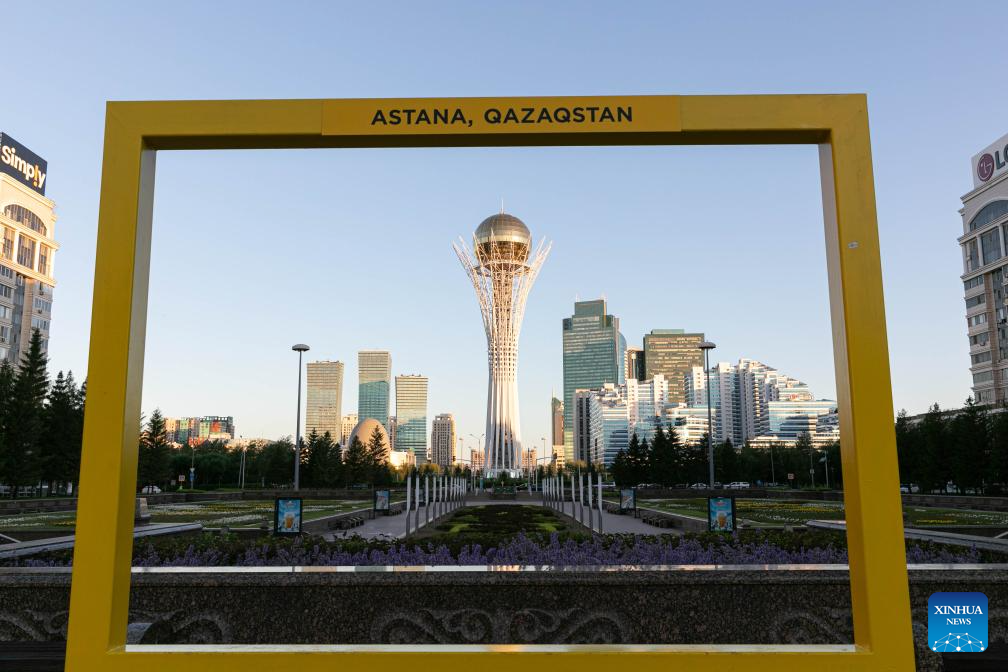Editor's note: The world is entering a new period of turbulence and change, with issues of concern emerging one after another worldwide. Against this backdrop, the Shanghai Cooperation Organisation maintains its position as a comprehensive cooperation grouping which contributes to regional development, peace and stability. With this year's SCO summit to be held in Astana, Kazakhstan, on July 3-4, our special series of articles, "Shanghai Spirit in a Chaotic World," looks at the SCO from different perspectives. In this first article of the series, Yaroslav Lissovolik, founder of "BRICS+ Analytics," a member of the Russian International Affairs Council (RIAC) and a special commentator on current affairs for CGTN, focuses on the economic cooperation of developing countries in Eurasia. The article reflects the author's opinions and not necessarily the views of CGTN.
The 24th Meeting of the Council of Heads of State of the Shanghai Cooperation Organization (SCO) in Kazakhstan from July 3 to 4, 2024, will take place at a crucial juncture for the regional organization as the economies of the developing world are bolstering their efforts to coordinate their policies on a wide range of global issues, including rising security tensions, mounting protectionism in the world's economies, and intensifying competition in high-tech space.
All these challenges will call for a concerted effort from the SCO members to raise the importance of economic cooperation in the agenda of the organization, most notably with respect to trade, and financial sector cooperation, as well as coordination in the flow of investment and labor migration.
In the sphere of economic integration, the SCO could become the main platform for the Eurasian developing economies – the trend of closer South-South integration is taking on a greater scale with a rising number of developing economies joining the SCO. After the accession of India and Pakistan in 2017, another Eurasian heavyweight to become a member was Iran in 2023. The next country to join the group could be Belarus – and the approval could come as early as the upcoming SCO summit in Kazakhstan.
Besides the current three observer states, there was also a sizable widening in the ranks of the dialogue partners in 2022 and 2023 to include such economies from the Middle East as Bahrain, Saudi Arabia and the United Arab Emirates (UAE).
It should be noted that the expansion in the SCO throughout the past several years has progressed in tandem with the BRICS expansion of 2023 and 2024, with several economies such as the UAE and Iran becoming BRICS members as well as raising the level of cooperation and involvement with the SCO. This creates scope for greater coordination between the SCO and BRICS going forward and indeed this year's Russian presidency in BRICS is advocating greater co-integration between the Eurasian Economic Union (EAEU), SCO and BRICS.
Taking the BRICS-SCO-EAEU initiative one step further, the SCO's outreach to counterparts from the developing world could be expanded via the creation of a platform for Eurasia's main regional blocs from the developing world that apart from the SCO core may also include the EAEU, the Gulf Cooperation Council, the Bay of Bengal Initiative for Multi-Sectoral Technical and Economic Cooperation and the Association of Southeast Asian Nations.
The expanded platform that brings together the main regional integration groupings in Eurasia could develop a roadmap for regional trade liberalization among developing economies, and serve as a key framework for advancing the "integration of integrations" format of South-South cooperation.
 The Baiterek Tower in Astana, Kazakhstan, June 29, 2024. /Xinhua
The Baiterek Tower in Astana, Kazakhstan, June 29, 2024. /Xinhua
In the financial sector, the SCO economies need to devise platforms for financing large-scale infrastructure projects in Eurasia. The demand for such connectivity projects remains significant from the landlocked economies of Central Asia such as Kazakhstan, Kyrgyzstan and Uzbekistan with the region already benefiting from China-proposed Belt and Road Initiative.
The SCO economies could accordingly discuss the creation of a platform for national and regional development banks that would co-finance projects in the infrastructure sphere. Another option to explore is the creation of an SCO development bank that would complement the efforts of other development institutions in bridging Eurasia's "infrastructure gap."
Given the elevated security threats in Eurasia and restrictions on migration coming from developed economies, there will be a need to advance cooperation in regulating migration flows between the members of SCO.
Indeed, some of the most sizeable South-South migration flows are observed among the economies of the SCO core as well as the group's dialogue partners. Among the key "donor-recipient" pairs of such migrant flows in Eurasia are the Pakistan-Saudi connection, and the Russia-Central Asia migration flows. The importance of coordination in the labor migration sphere also has to do with the crucial role of remittances for Central Asia's economies in poverty reduction and balanced economic growth.
Overall, the agenda at the SCO summit in Astana is broad and will call for increased coordination among the group's core members and their partners in the economic sphere. The trends in the remainder of this year will make such coordination even more critical as the importance and intensity of South-South trade, investment and migration flows are set to rise in the face of mounting protectionism coming from the advanced economies. The latter trends may well be exacerbated by the further swings in the electoral cycle in Europe and the U.S. in the second half of 2024.
The SCO summit presents a unique opportunity for developing economies to prepare for the tectonic shifts that are set to reconfigure the global economy in the coming years.
Yaroslav Lissovolik







